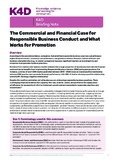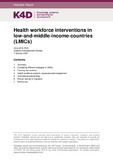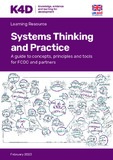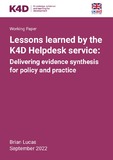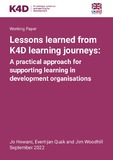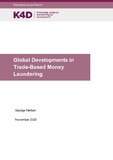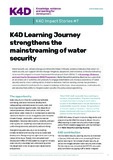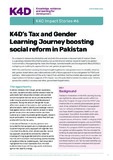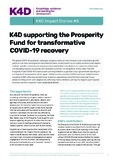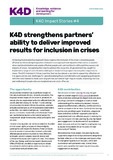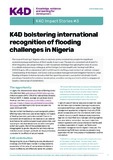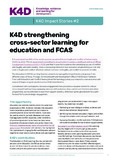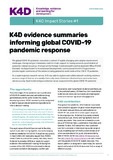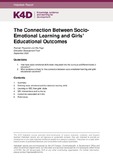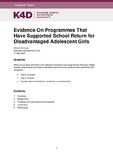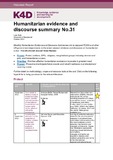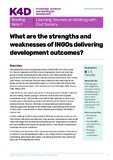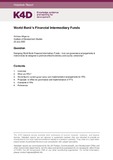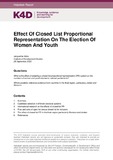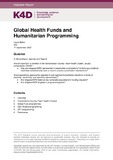K4D
Browse by
K4D supports learning and the use of evidence to improve the impact of development policy and programmes. The programme is designed to assist the Foreign, Commonwealth and Development Office (FCDO) and other partners to be innovative and responsive to rapidly changing and complex development challenges.
The evidence of what works in the challenging and uncertain contexts in which we work is highly complex. Without this evidence, programmes would not be designed for maximum impact and could be poor value for money. K4D provides an integrated approach to linking organisational learning processes with the use of evidence from research.
K4D is implemented by a consortium of leading knowledge institutions based in the UK, led by the Institute of Development Studies (IDS), with the University of Birmingham, International Development Department (IDD); Education Development Trust; Itad; the University of Leeds, Nuffield Centre for International Health & Development; Liverpool School of Tropical Medicine (LSTM); and the University of Manchester, Humanitarian and Conflict Response Institute (HCRI).
For more information about the K4D programme, please contact mailto:info@k4d.info
Recent Submissions
-
The Commercial and Financial Case for Responsible Business Conduct and What Works for Promotion
(Institute of Development Studies, 2023-07)This evidence brief shows that business’s sustainability strategies that drive better financial performance do so through mediating factors, such as enhancing business reputation, increasing stakeholder partnerships, ... -
Health Workforce Interventions in Low-and-Middle-Income-Countries (LMICs)
(Institute of Development Studies, 2022-01-07)The clearest overall message from across the literature is that designing human resources for health (HRH) initiatives should begin by understanding the needs of a health system or population rather than choosing a specific ... -
Systems Thinking and Practice: A Guide to Concepts, Principles and Tools for FCDO and Partners
(Institute of Development Studies, 2023-02-03)This guide is a basic reference on systems thinking and practice tailored to the context and needs of the UK Government’s Foreign, Commonwealth & Development Office (FCDO). It is an output of the FCDO Knowledge for Development ... -
Lessons Learned by the K4D Helpdesk Service: Delivering Evidence Synthesis for Policy and Practice
(Institute of Development Studies, 2022-11-21)This paper is a reflection on experience and lessons learned over the six years of the Knowledge, Evidence and Learning for Development (K4D) Programme (2016–2022). It reviews what the programme has learned about delivering ... -
Lessons Learned from K4D Learning Journeys: A Practical Approach for Supporting Learning in Development Organisations
(Institute of Development Studies, 2022-11-21)The Knowledge, Evidence and Learning for Development (K4D) Programme, which started in 2016, came to an end in September 2022. This K4D working paper reflects on the learning processes and approaches facilitated by this ... -
Global Developments in Trade-Based Money Laundering
(Institute of Development Studies, 2022-11-08)This rapid research review provides an overview of the current state of knowledge on the scale and dynamics of trade-based money laundering (TBML) and key challenges and opportunities in relation to TBML, both globally and ... -
K4D Learning Journey Strengthens the Mainstreaming of Water Security
(Institute of Development Studies, 2022-09)This K4D Impact Story shares how a K4D’s Water Security Learning Journey supported an extensive set of activities and products to engage stakeholders and increase awareness of water security and its cross-cutting nature. ... -
K4D’s Tax and Gender Learning Journey Boosting Social Reform in Pakistan
(Institute of Development Studies, 2022-09)As a means to reduce discrimination and promote the economic empowerment of women, there is a growing understanding that tax policy, tax administration and tax research need to be gender transformative. Recognising this ... -
K4D Supporting the Prosperity Fund for Transformative COVID-19 Recovery
(Institute of Development Studies, 2022-09)The global COVID-19 pandemic endangers progress made on more inclusive and sustainable growth patterns and risks slowing down international trade. Growth patterns are highly uncertain and require context-specific social ... -
K4D Strengthens Partners’ Ability to Deliver Improved Results for Inclusion in Crises
(Institute of Development Studies, 2022-09)Achieving Sustainable Development Goals requires the inclusion of the most vulnerable people affected by intersecting inequalities. Inclusion is an approach and objective that serves to counter structural discrimination ... -
K4D Bolstering International Recognition of Flooding Challenges in Nigeria
(Institute of Development Studies, 2022-09)The issue of flooding in Nigerian cities is relatively poorly documented, despite the significant economic damage and the loss of life it results in each year. The lack of a consistent set of data for informing policy and ... -
K4D Strengthening Cross-sector Learning for Education and FCAS
(Institute of Development Studies, 2022-09)This K4D Impact Story shares how the K4D’s Education in Fragile and Conflict Affected States (FCAS) Learning Journey supported the UK Government’s and global partners’ understanding of the subject, facilitated dialogue and ... -
K4D Evidence Summaries Informing Global COVID-19 Pandemic Response
(Institute of Development Studies, 2022-09)The global COVID-19 pandemic presented a context of rapidly changing and complex development challenges. Recognising an immediate need for timely support in making sense of a proliferation of pandemic-related resources, ... -
The Connection Between Socio-emotional Learning and Girls’ Educational Outcomes
(Institute of Development Studies, 2022-09)The literature on socio-emotional learning is vast, with a broad range of programmes and interventions spanning multiples ages with a variety of different objectives. A USAID systematic literature review of SEL interventions, ... -
Evidence on Programmes that have Supported School Return for Disadvantaged Adolescent Girls
(Institute of Development Studies, 2022-05-17)This paper collates evidence on promising programmes that have supported school return for disadvantaged out-of-school girls in Rwanda and in other comparable low-and-middle-income country contexts. The review found evidence ... -
Humanitarian Evidence and Discourse Summary No.31
(Institute of Development Studies, 2022-10)This is the 31st monthly Knowledge, Evidence and Learning for Development (K4D) Programme’s Humanitarian Evidence Summary (HUMES), signposting to the latest relevant evidence and discourse on humanitarian action to inform ... -
Working with Civil Society Briefing Notes
(Institute of Development Studies, 2022-10)In 2018 key concerns included shrinking civic space and the impact of this on democracy. Developments between the two periods, particularly the COVID-19 pandemic, the Black Lives Matter and decolonisation movements, have ... -
World Bank’s Financial Intermediary Funds
(Institute of Development Studies, 2022-07-22)Financial Intermediary Funds (FIFs) are a type of trust fund that provide large-scale funding for broad, coordinated interventions that are typically focused on specific themes (see section 5) and aimed at achieving Global ... -
Effect of Closed List Proportional Representation on the Election of Women and Youth
(Institute of Development Studies, 2022-09-28)There is evidence that a closed list proportional representation (PR) system increases the election of female and youth candidates, particularly when accompanied by a type of quota known as a placement mandate. The exact ... -
Global Health Funds and Humanitarian Programming
(Institute of Development Studies, 2022-09-01)There is a lack of reporting on the connection between Humanitarian Country Team Health Clusters and the three funds (the Global Fund, the Gavi Alliance, and the Global Financing Facility (GFF)), both generally and for the ...

